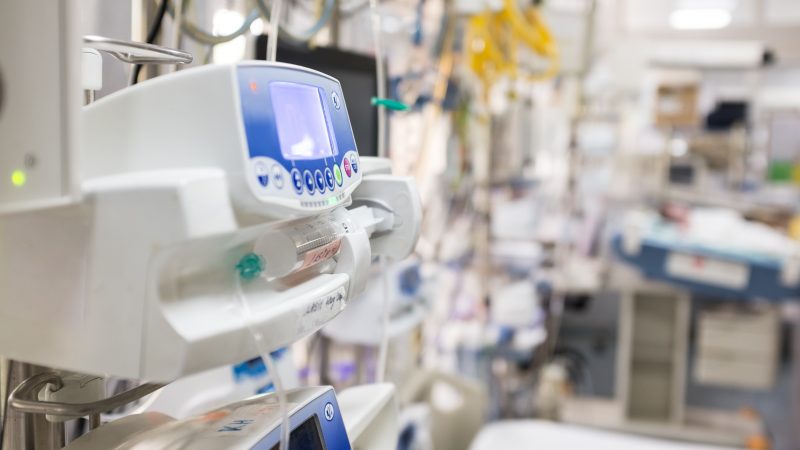
Jonathan Ashworth has told ministers that the need for a “credible long-term NHS rescue plan to deliver quality care” is now “beyond urgent” as patients left waiting for treatment face the risk of permanent disability.
Analysis by Labour released today found that patients in 83 hospitals are routinely left waiting longer than the 18-week NHS standard for specific surgeries or treatments such as oral surgery, ear nose and throat surgery or ophthalmology.
The Shadow Health Secretary said: “Patients in every town and city are forced to endure lengthening waits for treatment in debilitating pain and facing anxiety at the risk of permanent disability.
“Increasing numbers are forced to take out loans to go private while others have no option but to suffer ongoing agony and discomfort for months.
“Ultimately patients are paying the price for Tory failure to support the NHS and staff over the past decade – leaving the service understaffed, with beds cut and lacking the diagnostic equipment needed.
“The last Labour government delivered treatment within 18 weeks for patients. But under Boris Johnson hundreds of thousands of patients are waiting over a year.”
Office for National statistics reporting showed earlier this year that the number of people waiting longer than 18 weeks, the maximum waiting time set out in the NHS constitution, had risen across all 18 treatment areas.
The analysis of NHS waiting list data by Labour showed that the number of people waiting more than 18 weeks for trauma and orthopaedic surgery is now close to a quarter of a million people, with 57,488 people waiting more than 52 weeks.
The figures also revealed that over 13,000 children are waiting more than a year for paediatric services, and 155 people have been left waiting for over a year to receive mental health support.
Patients waiting for trauma and orthopaedic surgery at Airedale NHS foundation trust wait on average 22 weeks, according to the research, and the average wait for ophthalmology at Buckinghamshire healthcare NHS trust is 19.2 weeks.
The wait for the gastroenterology service at Dorset County Hospital is on average 19.7 weeks, and patients are left waiting an average of 44 weeks at the University Hospitals West Midlands for rheumatology services.
“Enough is enough. The NHS is on its knees and will not cope unless ministers listen to staff and patients. A credible long term NHS rescue plan to deliver quality care is now beyond urgent,” Ashworth added.
“Patients in pain will be asking whether Boris Johnson’s promises on the NHS are meaningless. Ministers must now take the action needed to prevent people becoming seriously ill, to deliver care on time, and return the NHS to the world class service it should be.”
The Institute for Fiscal Studies warned earlier this month that, as a result of people not coming forward for treatment throughout the pandemic, up to 14 million people could be on NHS waiting lists by next autumn.
The IFS analysis highlighted that seven million fewer people joined waiting NHS lists than was normal after the first wave of the virus last year, and predicted that many of these “missing patients” are now more likely come forward.
“Even if only two-thirds of the missing patients return then with capacity at 95% of pre-pandemic levels – much more than the NHS is currently managing – waiting lists could easily exceed 13 million (and keep growing),” the IFS said.
The Shadow Health Secretary has repeatedly called on the government to take steps to tackle the problem, saying in April this year that “Labour will be using our voice and vote in parliament to demand action to bring waiting lists down”.
Ashworth has also challenged the government over the timing of the major structural reforms unveiled by ministers in their health and care bill, calling for the government to instead focus on bringing down waiting lists.
GMB national officer Rachel Harrison said that the health service is facing a recruitment and retention crisis and warned that “after ten years of pay cuts and underfunding, morale among NHS staff is at rock bottom”.
“GMB is calling for a restorative 15% increase to make up for a decade of slashed pay under the Conservatives. We have no hesitation in recommending members vote to reject the 3% and no hesitation in supporting members if they want to take action,” she said.
Ministers last year proposed a 1% pay rise for nurses, health assistants and other NHS staff, alongside a pay freeze for all other public sector workers, which would have been a pay cut once inflation was taken into account.
The government recently confirmed that it would accept the recommendations of pay review bodies and offer a 3% rise for some NHS staff. Labour has described this as a “let down” and highlighted that it is not an NHS-wide pay award.
Recent Savanta ComRes research for LabourList found that 60% of UK adults think the 3% pay rise announced by the government was either “a little too little” (27%) or “much too little” (33%). 15% said it was “too much” and 23% “about right”.
Asked to indicate which % pay rise they think it would be reasonable for NHS workers to receive this year, 47% chose a figure between 4% and 9%, while 32% chose 10% or above and only 21% opted for between 0% and 3%.




More from LabourList
Majority of Labour members oppose government’s anti-migration measures
‘First past the post is corroding trust in politics. The government must make all elections fit for the future’
‘Hope starts young: Why Labour must tell the story of a better tomorrow’